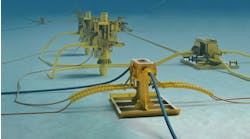IDC survey assesses digital innovation challenges and solutions in oil and gas
By Andrew Meyers, IDC
The oil and gas industry is experiencing a renaissance as post-pandemic demand has recovered reviving commodity prices. With every industry contraction comes expansion, and expansion often requires reacquisition and development of talent. The oil and gas enterprise (by wider industry standards) is not generally perceived as particularly agile. Inflation and deflation of oil and gas companies linear with industry cycles are common and further challenge digital transformation initiatives in many companies.
From a technical operations perspective, some specialized technical roles, such as petroleum engineering, have long been challenged in talent acquisition. This acquisition challenge is conflated by the need for hybrid technical and digital talent to build the smart artificial intelligence (AI)-driven oil and gas enterprise while being mindful of associated risks.
The larger ambition is the end-to-end smart enterprise where digital teams have developed interconnected point solutions that yield a greater compounded effect, whereas the sum is greater than its parts. Companies viewed as digital leaders believe the future is a mix of traditional information technology (IT) roles, hybrid digital and operations, and pure operations. In IDC's 2022 Oil and Gas AI Path Survey, companies with more than 1,000 employees have a preference for team mix for innovation (Figure 1).IT/OT (operational technology) convergence lends itself to the thinking around these mixed digital teams and spending time and resources to acquire and develop talent. As growth in autonomous operations drives the increase in remotely managed operations, blending the competencies becomes more imperative. Traditional IT roles will have less emphasis on infrastructure and hardware and more on governance and de-risking digital in operations.
IT/OT convergence has actually reduced labor costs for a significant number of companies, according to IDC's 2022 Oil and Gas IT/OT Convergence Survey (Figure 2):
- 72.7% of oil and gas leaders saw a positive impact to labor costs through IT/OT convergence projects
- 33.8% of respondents believed the positive impact on costs was 11% or greater
Security is a significant labor cost driver as well with less blended skills teams. Operations teams fear stringent cybersecurity protocols that hamper efficiency in the field and office. In fact, in IDC's 2022 Oil and Gas IT/OT Convergence Survey, IT professionals were asked on a scale of 1-5 how much cybersecurity support operations professionals required (1 being high support, 5 being low support). More than 50% rated operations as 1 or 2 (Figure 3).
Hybrid operations teams reduce the ever-increasing costs cybersecurity will pose, as what was once considered isolated systems at a remote operations site now becomes far more connected to enterprise systems. The industry's never-ending pursuit of safety and efficiency will drive more development and deployment of automation and therefore increased connectedness.IDC research suggests looking internally within functions of finance, operations, engineering and other company functions for digital innovation talent. Unfortunately, due to the lack of maturity of these hybrid teams, there is not a preponderance of this talent in the market.
In IDC's 2022 Oil and Gas AI Path Survey, companies with more than 1,000 employees have significant aspirations to filling many roles to drive digital innovation (Figure 4). For example, 50% of companies expect to hire a chief strategy and/or transformation officer in the next 12 months. Other roles looking to be filled are data scientists, data architects, AI solution architects and DevOps/ModelOps, among others.It is worth noting that the word "hire" is referring to both internal and external hiring. IDC's view is many of these roles will be internally developed and filled.
Another observation in the research is that many oil and gas companies are looking to utilize internal innovation teams rather than leveraging some of the outsourced offerings that are available. This would be project specific, and balance tends to go back and forth over time.
06.02.2023







